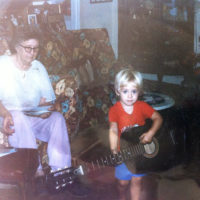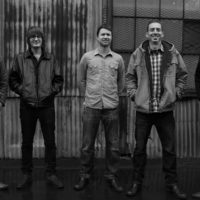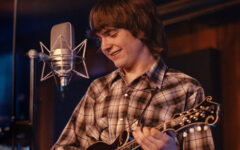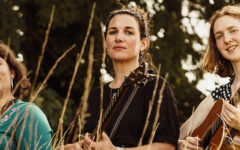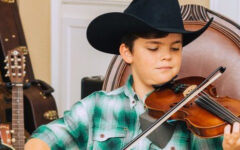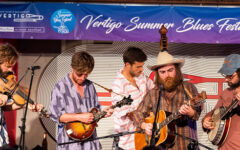
Yoseff Tucker hit the San Francisco bluegrass scene from the California Central Valley with a bang several years back. He’s won multiple Northern California Bluegrass Society awards for guitar and vocals, and his sound reflects his family’s Central Valley Oklahoma Dust Bowl heritage. Yoseff plays in several Bay Area bands and is an active and frequent instructor in the California Bluegrass Association’s youth programs and camps. I enjoyed getting his story and, frankly, it is long overdue.
Hello Yoseff. How did you first get hooked on bluegrass?
I was trying to learn how to “play the fiddle on the guitar” and my friend introduced me to Joe Russomano in Fresno, who flatpicked fiddle tunes. We started pickin’ together and he invited me to a jam hosted by the Fresno Folklore Society. We showed up late as people were leaving, but Tom Naiman, Jon Schaffer, and John Cogdill insisted on jamming and brought their instruments back out. From there, I started going over to Tom’s house to jam. Tom loaned me a few bluegrass compilations at first, and eventually he loaned me a copy of the documentary, Bluegrass Journey. In that documentary, there’s a 10 second clip of Dan Paisley singing Sittin’ On Top of the World. Jackpot! I was all-in as soon as I heard Dan Paisley. This would have been around 2005.
Anyways, Tom started taking me to festivals and eventually invited me to play in his band, The Dalton Mountain Gang, with Schafer and Cogdill. Special shout-out to Tom Naiman – I don’t think I could ever repay him for his generosity and for setting me on the right path.
Growing up was your family musical?
My grandpa Marshall Tucker (not that one) played the fiddle and the guitar. He migrated out to the Central Valley of California from Vinita, Oklahoma during the Great Depression. He and his siblings were very musical. I have a few fond memories of him, his brother Hobert (guitar), and my Aunt Kay (fiddle) jamming together. Out of my grandpa’s kids, I’m the only one that plays now.
My grandpa was always putting guitars in my hands and was intent on me being his rhythm guitar player. He taught me chords and a flatpicking break to Frankie and Johnny that I still remember. As a teenager, I got too cool for his music and started playing metal and punk. While I was in high school, my grandpa suffered a stroke and was diagnosed with early onset dementia. He didn’t recognize me after the stroke, I think he remembered me more as a little kid.
He was eventually put into a elderly care facility. On one of our visits, I was playing guitar for him. I was in my early 20s and playing this angsty-folky garbage that I was writing at the time. My dad noticed my grandpa grimacing at my music and asked me to play the stuff my grandpa taught me when I was younger. When I did, my grandpa started smiling and tapping his foot. He then told me that he had a grandson that played the guitar, and that I ought to hear him.
I went home, and not really knowing what genre flatpicking was from, and thinking that I wasn’t good enough to play the fiddle like he did, so I started searching for how to “play fiddle music on the guitar.”
Wonderful… what instruments do you play nowadays?
Mostly guitar, but I dabble with the banjo and the mandolin. I pretend to play bass very poorly sometimes.
Tell us about your first instrument. Do you still have it?
It’s an old Global Spanish style guitar that my grandpa put steel strings on. I still have it. I have a photo of me with it when I was younger. Call me sentimental, but I haven’t changed the strings.
Who was your biggest musical influence growing up versus now?
Aside from my grandpa, my family listened to a lot of ’90s country, and I listened to what any kid growing up in the ’90s would – Nirvana, Rush, Metallica, Guns N’ Roses, etc. Now, I’d have to say my biggest influences are the Stanley Brothers, Vern and Del Williams, Del McCoury, and Larry Sparks.
Tell us about the bands you play in.
Since I have a day job, I can afford the luxury of playing music only with people that I really like. I think that’s very important.
I joined Jeff Scroggins and the Scroggdogs last year with Jeff Scroggins, Scott Gates, Jan Purat, and Zach Sharpe. We play mostly traditional stuff, very aggressively. Scott and Jeff are both forces of nature. I’m super excited about this project as I’ve been dying to be in a band with Scott for years, Zach and Jan are my best friends, and Jeff is quickly becoming a dear friend. So far we’ve done two European tours and miscellaneous gigs in California and Colorado. This year, we’re planning on recording an album with Patuxent Music, and we’re lining up another European tour in the fall.
The Bow Ties is a San Francisco-based traditional bluegrass band with members Andrew March (mandolin), Billy Moore (banjo), Jan Purat (fiddle), and Zach Sharpe (bass). I consider everyone in this band a best friend. Billy and I have been singing together for 12 years, and Jan and Andrew legitimize the outfit with their virtuosity. Zach keeps us all in the pocket. I’m very proud of the album we released, Old Morphine, produced by Sally Van Meter.
The Central Valley Boys is another traditional bluegrass band I’m in. The other members of the band are Dave Gooding (bass), John Cogdill (mandolin), Pete Hicks (fiddle), and Victor Skidenenko (banjo). We focus on having a tight vocal trio. John, Pete, and Victor are all great singers. Dave is a killer emcee and a great band leader. We’ve been a band for 10 years and we buy new suits every other year.
I’m also in Blue and Lonesome, a traditional bluegrass band with Ed Neff (mandolin), Larry Cohea (banjo), Paul Shelasky (fiddle), and my wife, Katya Tucker (bass). Sue Walters often fills in for Katya whenever she is stuck at work. This band is my bluegrass bootcamp. Ed, Larry, and Paul are my heroes and Ed has been a great mentor to me since I’ve been in the band. We just released an EP called A Tiny Taste Of Blue and Lonesome, and you can find us at the Willowbrook Alehouse the first two Thursdays of the month.
Supermule is an eclectic mix of funk and bluegrass. Members of the band include Alisa Rose (fiddle), Jim Chayka (banjo), Mike Emerson (keys), Nino Moschella (drums), and Zach Sharpe (bass). I feel pretty lucky to be in this band of incredible musicians. We recently released an EP I am proud of called Pretty Little Birds.
Lost Radio Drift is a trio with my wife Katya and Nat Keefe of Hot Buttered Rum fame. We play a mix of Nat’s traditionally bent originals and old and quirky songs that Katya and I can dig up. It’s a super fun little group and I feel we’ve got a great vocal trio.
Are the ScroggDogs tours as much fun as it looks?
Everyone is so well behaved and I come home refreshed. It’s like going on a yoga retreat.
Ha, right. Tell us about your involvement with the CBA, and with its youth programs.
I’ve played the Father’s Day Bluegrass Festival as a California Showcase artist with the Central Valley Boys and the Bow Ties. I’ll be there this year with Blue and Lonesome. I’ve also played Vern’s stage with the Dalton Mountain Gang, Nell Robinson, Windy Hill, and Lost Radio Drift. The Central Valley Boys have played the ballroom at the Great 48 in Bakersfield and a few showcases as well.
I’ve been teaching at the CBA Youth Camp during the Father’s Day Festival since 2015, two years after the camp started, I believe. Before that I helped with other youth activities that Darby Brandli was trying to foster. I wish I’d found this music earlier, and it’s my way of giving back.
What interests you when you are not playing music?
I’m a huge nerd. I play Dungeons and Dragons, tabletop board games, and video games.
What shows or events are most memorable for you?
The most memorable event for me was when the Bow Ties won RockyGrass in 2018. It was a dream of mine to win that competition since 49 Special won it in 2009. The Bow Ties worked really hard leading up to it. The format of the competition is really nerve-racking – it was the most nervous I’d seen anyone in the Bow Ties. The crowd is really amped up. Of course, playing RockyGrass the following year in our Sweatsedos was incredible. Shout out to Sweatsedo – moving at the speed of leisure.
Tell us about your experiences at Amnesia.
I first played Amnesia in 2009 as part of the San Francisco Bluegrass and Old-Time Festival. From there, I started filling in nights with Cameron Sellers whenever the Barefoot Nellies couldn’t make it. I started playing there regularly with Windy Hill when they got their residency in 2010. I played a couple of shows with the Earl Brothers also. I started putting together pick-up bands for Front Country whenever they were on tour, and eventually the Bow Ties were offered the second Monday slot in 2014 and played until the bitter end.
I lived two blocks away from Amneisa from 2013 to 2017 and would frequent the jams and shows. I’ve even seen Dave Berry play with Toshio Hirano quite a few times! I have a lot of great memories at Amnesia and it’ll always hold a special place in my heart.
Good times. I’m pretty sure the Bow Ties took over Toshio’s spot when he retired. What era of bluegrass is your bread and butter?
1946 to 1966 is my favorite era. But more specifically, Monroe’s ‘46 band, Flatt and Scruggs from ‘48 to ‘52, and almost all of the Stanley Brothers and Jimmy Martin from this period.
How do you think a musician can continue to improve?
The most important thing is to maintain a growth mindset. I try not to think or speak about skills as though they’re fixed. We’re conditioned to think “that person is talented” rather than acknowledge the hard work and dedication someone has put into their craft. You’re probably a lot better than you were five years ago, so why hold yourself down with thoughts like, “I’ll never be able to x,y,z…”?
The second most important thing is to actually listen to yourself and be deliberate and intentional in what you choose to develop. Record yourself and listen back constantly. Break things down to a small piece of something that’s just outside of your wheelhouse, and work on it until you’ve got it down from a cold start. Then find the next thing that’s just outside of your reach. If it’s not easy to identify what you need to work on, find a mentor who can help.
What musical challenge have you had and how did you overcome it?
Singing is a constant mind-game for me. One time I told Ed Neff that I didn’t think I was breathing right, and he asked, “are you not going in and out?” I overthink it a lot. I’ll let you know when I figure it out!
You have a very strong lead vocal. Can you remember the first song you felt that you really “owned”?
Thank you. I’d have you to tell you, I’ve been through the wringer with my singing, from several different affectations, technical issues, doubt – you name it. There have always been songs that I’ve been able to connect with and deliver emotionally, but I’ve really only been satisfied with my delivery of certain songs in the last two years. On a recording, I’m probably most proud of Close By on the Bow Ties album Old Morphine. Lately I’ve been singing Lonesome Road to Travel (Monroe via Joe Stuart), and Larry Cohea says I lacquer it, which is the highest form of praise I can think of.
Who are your favorite singers and why?
Carter Stanley because he has the most natural phrasing; his singing is as smooth as talking. Dan Paisley because his singing is pure joy and he’s not afraid to put his foot down and let it fly. Del McCoury because he leans into it. Del Williams because he just stomps everyone with his huge tone.
What do you do when you first pick up your instrument each day?
I run through a couple of songs that I’m woodshedding, usually in a lower key than I actually sing them. Most of the time I’m working on crosspicking.
What is it about music that touches people so deeply?
There’s something elemental or spiritual about music. For some people, it cuts right to the bone, and I’d rather leave the reasons for it arcane. If I had to guess, the real good stuff comes from the heart, and music is by far the best medium for transferring emotion.
Are you Stones or Beatles?
I haven’t listened to much of either, but I prefer raw emotion over technical proficiency. Call me a Luddite, but I’m not really moved by things because they’re technically impressive. I’m moved by stuff that’s raw, real, and honest.
Any final thoughts?
Thank you so much for interviewing me! Thanks to the CBA and all the volunteers for making the CBA Fathers Day Festival in Grass Valley the happiest time of the year, and everything else that they do to promote this music. Shout-out to Bluegrass Pride for carrying the banner so people can know that this music is for everyone.
Copy editing by Jeanie Poling

